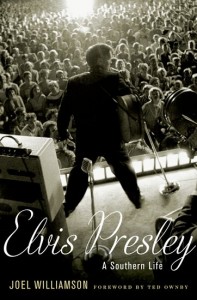 OXFORD, Miss. – Elvis Presley is the undisputed King of Rock ‘n’ Roll, and he is back in the spotlight with a new biography that captures the drama of his career.
OXFORD, Miss. – Elvis Presley is the undisputed King of Rock ‘n’ Roll, and he is back in the spotlight with a new biography that captures the drama of his career.
In “Elvis Presley: A Southern Life,” Southern historian Joel Williamson, professor emeritus of the humanities at the University of North Carolina at Chapel Hill, takes on one of the greatest cultural icons of all time.
Ted Ownby, director of the Center for the Study of Southern Culture at the University of Mississippi, wrote the foreword for the book, which is published by Oxford University Press. Ownby, professor of history and Southern studies who first became involved as a reviewer for the press, said he is happy to have even a little involvement with such an important book by one of his favorite historians.
“My foreword tries to summarize what is unique about Elvis Presley, when there are already a good number of Elvis biographies,” Ownby said. “I think the two most distinctive things about Williamson’s book are, first, that it emphasizes his female fans about as much as it discusses Presley himself and, second, that it says Presley got stuck as an object of female desire in his late teens and early 20s and never really moved out of that role for the rest of his life.”
Williamson is a renowned historian known for his inimitable and compelling narrative style. Rather than focusing on Elvis’s music and the music industry, “Elvis Presley: A Southern Life” illuminates the zenith of his career, his period of deepest creativity, which captured a legion of fans and kept them fervently loyal for decades. Williamson shows how Elvis himself changed – and didn’t. In the latter part of his career, when he performed regular gigs in Las Vegas and toured second-tier cities, he moved beyond the South to a national audience that bought his albums and watched his movies.
“The book helps us understand a lot about music and youth and sex and celebrity, all with Southern roots and surprises,” Ownby said. “And it’s also just a great biography that goes beyond seeing Elvis as a case study or example and instead tells a complicated, fascinating story.”
In the foreword, Ownby writes, “The book left me in a bit of a daze, and in truth, although it is a long book, I wanted it, like a really good concert, to keep going.”
Williamson is the author of a number of landmark works on Southern culture, including “William Faulkner and Southern History” (Oxford University Press, 1993), and “The Crucible of Race: Black-White Relations in the American South Since Emancipation” (Oxford University Press, 1984).
Ownby has most recently co-edited “The Larder: Food Studies Methods from the American South” (University of Georgia Press), and written “American Dreams in Mississippi: Consumers, Poverty, and Culture, 1830-1998″ and “Subduing Satan: Religion, Recreation and Manhood in the Rural South, 1865-1920.”